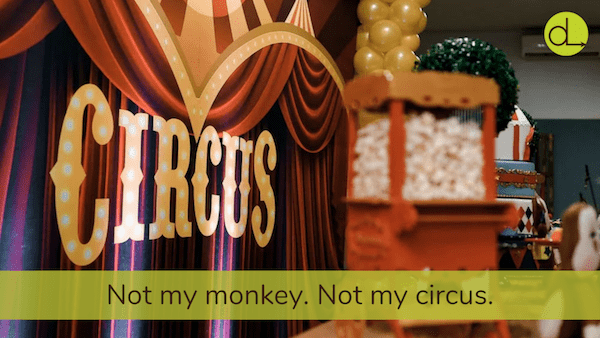“Ugh. My office is full of monkeys.”
No. I wasn’t coaching a zookeeper or veterinarian. My client, let’s call him Ben, was Vice President of Sales. He had quickly climbed the leadership ladder because of his excellent track record in sales. His organization hired me to coach him because they were afraid of him burning out.
As Ben put it, “I’m working all the time. There has to be a way I can be more efficient. I love what I do, and I don’t want to lower any sales goals. But I’d also like to be able to take a weekend off every once in a while. My kids rarely see me without my phone in my hand.”
Sounds like a productivity issue, right? Ben needs some time management techniques or to design a more effective schedule. Turns out, Ben’s problem had nothing to do with his schedule. Ben was dealing with people problems.
There is a classic Harvard Business Review article entitled, Management Time: Who’s Got the Monkey by William Oncken, Jr. and Donald Wass. Just as the title suggests, the article invites leaders to assess how often they take on projects or tasks because it seems easier to take care of it themselves.
With each project or task you take responsibility for, you end up with another monkey to care for and feed. If you’re not careful, you can end up with an office full of monkeys—and colleagues that know you’ll accept their monkeys (tasks).
What people problems lead to an office full of monkeys?
Do any of these sound familiar?
- A direct report tells you he’s not sure how to complete a task. You let him know you’ll just take care of it. It’s easier than trying to teach him.
- A colleague asks if you can help with a project. The next thing you know, you’re now managing the whole project.
- An associate completes a task to about 90% or is consistently making the same mistake. It’s just easier if you complete it or fix it for them.
- You have a recurring task you could delegate, but it’d take longer to train someone than simply doing the task. So you do it. For weeks, or months, or forever.
Did you think it was just you that deals with these people problems? It’s not! This is how we end up with monkeys, and it feels like you have to figure out how to manage your time better. In reality, you need to manage your people problems better.
In each of these situations, a conversation is needed. This is where the Thoughtfully Fit practice of Balance can help. When you have a Balanced conversation you balance what you need or want with what the other person needs or wants. That might mean having a conversation about boundaries, expectations, or performance.
You might be thinking, “It’s easier to have an office full of monkeys than to have those conversations!” I hear you. But when you commit to having those conversations, you not only get your own time back, you’re putting your people first. You demonstrate that you want to invest in their development. That’s a win-win.
One-Minute Thoughtfully Fit Workout

Pause. The next time you recognize a monkey in your office that either doesn’t belong there or needs to leave with the person it came in with, Pause.
Think. What do I need? What is the people problem that needs to be addressed? How can I make sure they leave with their monkey?
Act: Commit to having the conversation to keep those monkeys where they belong.
The Impact of Monkeys
Taking on other people’s monkeys not only creates more work for you, it prevents you from doing the work you could be doing. In Ben’s case, dealing with all these monkeys was preventing him from thinking strategically or being innovative. The monkeys also meant he was doing his people’s work instead of doing people development.
Imagine what you could be doing if you weren’t taking care of all of these monkeys. Take care of your people problems and take note of the impact on your productivity!
Thoughtfully,



